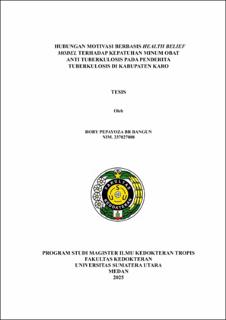Hubungan Motivasi Berbasis Health Belief Model terhadap Kepatuhan Minum Obat Anti Tuberkulosis pada Penderita Tuberkulosis di Kabupaten Karo
The Influence of Health Belief Model-based motivation on Adherence to Anti-tuberculosis Treatment among TB Patients in Karo Regency, North Sumatra, Indonesia

Date
2025Author
Bangun, Rory Pepayoza Br
Advisor(s)
Daulay, Rini Savitri
Mayasari, Evita
Metadata
Show full item recordAbstract
Adherence to tuberculosis (TB) treatment is essential for the success of TB control programs. Non-adherence to anti-TB drugs increases the risk of treatment failure, drug resistance, and higher healthcare costs. The Health Belief Model (HBM) is widely used to address adherence challenges. This study aims to analyze the relationship between HBM-based motivation and adherence to anti-TB drugs in Karo Regency, Indonesia. A cross-sectional study was conducted in four health centers in Karo Regency from October to December 2024, involving 70 TB patients in the early phase of treatment. Participants were selected using purposive sampling. Data were collected through a structured questionnaire that had been tested for validity and reliability. Statistical analysis was performed using SPSS 26, including chi-square tests and logistic regression, with a 95% confidence interval (CI) and a significance level of p<0.05. A significant relationship was found between perceived susceptibility and adherence to anti-TB drugs (p = 0.045, OR 95% CI = 7.169), indicating that patients with a high perceived susceptibility were seven times more likely to adhere to TB treatment. Additionally, knowledge was significantly associated with adherence (p = 0.042, OR 95% CI = 11.551), meaning that patients with good knowledge were 11 times more likely to adhere to anti-TB treatment. Knowledge emerged as the most dominant factor influencing adherence. Perceived susceptibility and knowledge significantly influence adherence to anti-TB drugs in Karo Regency. Strengthening patient education and awareness is crucial in improving TB treatment adherence.
